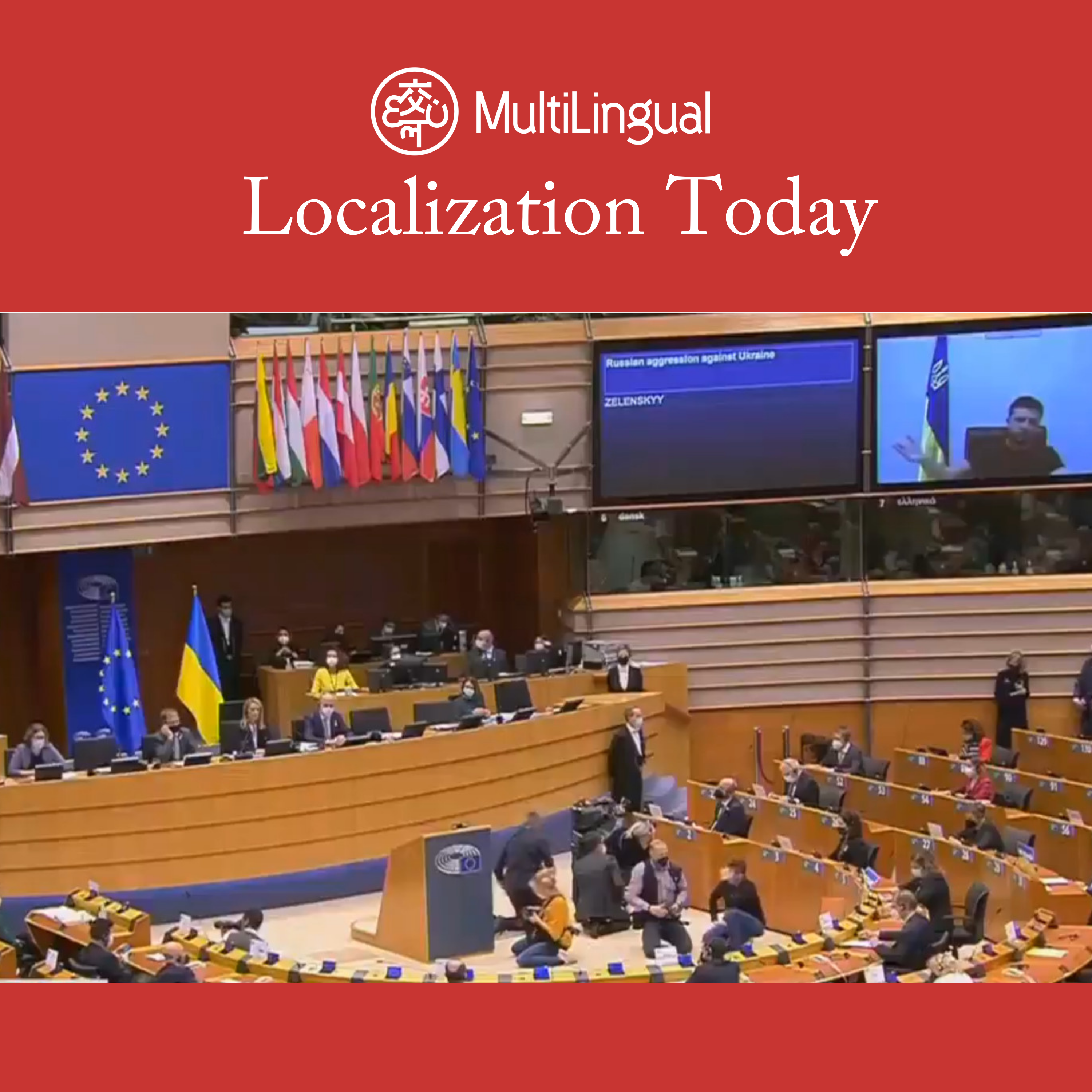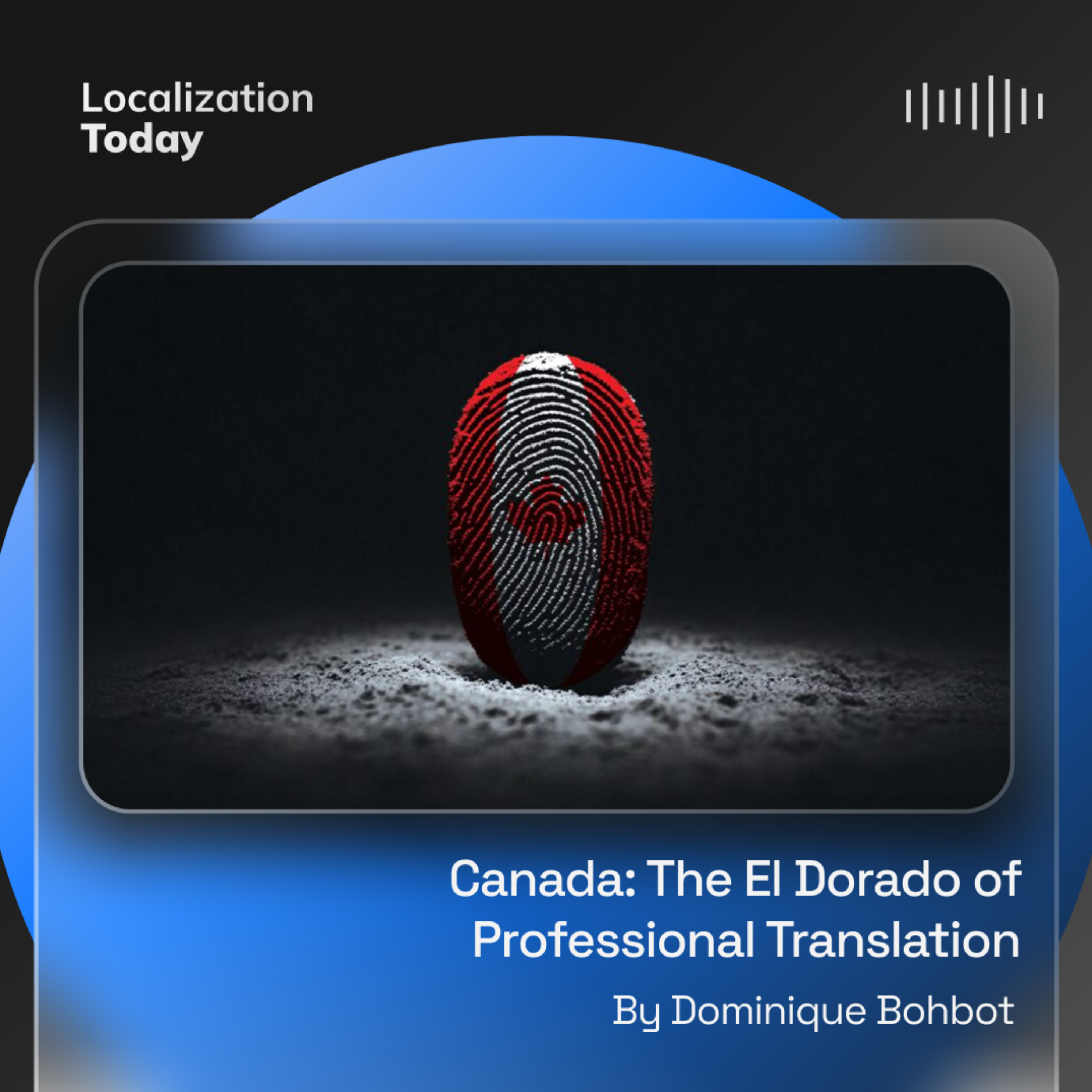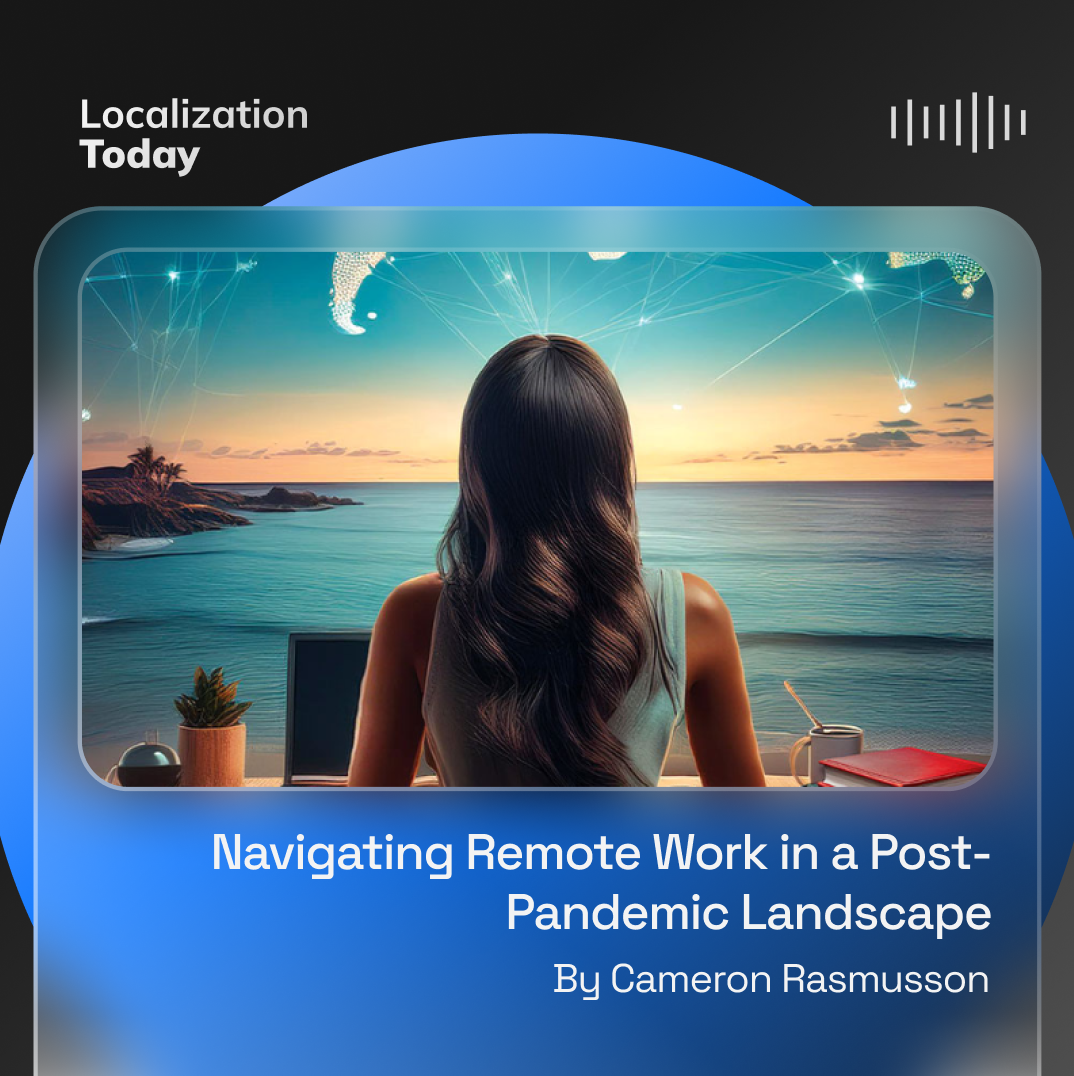Episode Transcript
[00:00:06] Speaker A: This is localization Today, a podcast from multilingual media covering the most relevant daily news in the language industry.
[00:00:16] Speaker B: Enabling the american journey expanding language access for LEP individuals in the US by.
[00:00:23] Speaker C: Dima Jaradat Nothing enriches the american salad.
[00:00:27] Speaker D: Bowl like the medley of limited english.
[00:00:29] Speaker B: Proficient LEP individuals who are also speakers.
[00:00:33] Speaker D: Of various foreign languages. Linguistic diversity is an inextricable thread in the fabric of the US as we.
[00:00:39] Speaker B: Know it today, and diversity and inclusion stand among the nation's major assets.
[00:00:45] Speaker D: Recognizing language access as a fundamental right is crucial for ensuring that every individual.
[00:00:51] Speaker B: Regardless of their english proficiency, can navigate essential aspects of their american journey, such as paperwork or health care, without undue delays. In recent times, linguists extended a commendable.
[00:01:03] Speaker D: Effort to expand language access, particularly in.
[00:01:07] Speaker B: Governmental content, to cater to the needs of let persons. In August 2000, President Bill Clinton signed.
[00:01:14] Speaker D: Executive Order 13 166 EO 13 166 improving access to services for people with limited english proficiency. The commitment to language access was echoed again in January 2024, when New Jersey passed Bill s 2459, requiring all state government entities to render their vital content in seven of the state's most common languages.
[00:01:41] Speaker B: While great progress has been made, much work remains.
[00:01:45] Speaker D: The good news is language access does.
[00:01:47] Speaker B: Not have to be a resource consuming endeavor. Cost effective winwin solutions for all stakeholders, including linguists, let persons, government agencies, and foreign language and translation programs nationwide are perfectly achievable. Man versus machine becomes man and machine.
[00:02:07] Speaker D: Human technology collaboration is not only the.
[00:02:10] Speaker B: Future, but also the present reality, especially in our field. Machine translation, MT, and artificial intelligence AI.
[00:02:19] Speaker D: Systems are being integrated daily into the.
[00:02:22] Speaker B: Work of linguists, and a symbiotic relationship.
[00:02:25] Speaker D: With the emerging technology is hence more critical than ever. To thrive and survive in this evolving.
[00:02:31] Speaker B: Landscape, linguists need to be adaptable, malleable.
[00:02:35] Speaker D: And willing to reinvent themselves.
The advent of these systems will not.
[00:02:40] Speaker B: Make human linguists jobless, but will rather.
[00:02:42] Speaker D: Reimagine their roles and expand possibilities. Human tech collaborations can help make knowledge accessible to everybody in a cost effective, efficient fashion. To best reap the benefits of human tech collaborations, it is essential to acknowledge the weaknesses and strengths of both MT.
[00:03:00] Speaker B: Engines and human translators.
[00:03:03] Speaker D: For example, MT plugins can translate just.
[00:03:06] Speaker B: About any government website of any size in seconds, but the accuracy and reliability of their output are not yet up to par.
[00:03:14] Speaker D: This is where the human finesse can.
[00:03:16] Speaker B: Step in to refine their accuracy, reliability, acceptability, and cultural sensitivity.
[00:03:23] Speaker C: Where applicable, language access expansion could start.
[00:03:27] Speaker B: With investing in empty post editing MTP.
[00:03:30] Speaker D: In other words, instead of brushing empty engines, all linguists aside, altogether, they can.
[00:03:36] Speaker B: Work together and complement each other. Speaking of complementary relationships, two heads think better than one, and while human intelligence is irreplaceable, it is augmentable by AI, especially generative AI.
[00:03:49] Speaker D: These stateoftheart systems are the epitome of.
[00:03:52] Speaker C: You are what you eat.
[00:03:53] Speaker D: Therefore, agencies and entities with LEP oriented content to translate can invest in training and fine tuning AI models specifically for translating their content.
[00:04:03] Speaker B: Term management means bigger impact.
[00:04:06] Speaker D: Good translation maintains consistency across the board, and there is no doing that without managing content at a granular level.
[00:04:14] Speaker B: Starting with terminology, agencies and entities with.
[00:04:17] Speaker D: Content to translate may invest in creating.
[00:04:20] Speaker B: A public terminology database term base comprising key terms, which creates yet another avenue.
[00:04:27] Speaker D: For human tech collaborations.
[00:04:29] Speaker B: AI systems, for example, can help extract.
[00:04:32] Speaker D: Terms from a text of any size in just seconds.
[00:04:36] Speaker B: Though arguably just like the good old term extraction tools, they produce much noise unwanted terms in the process.
[00:04:44] Speaker D: Linguists can then clean up the noise and document the terms in a user friendly term base. There is a wealth of research on.
[00:04:52] Speaker B: The high return on investment Roy termbases can generate, and in this case, the Roy is tofold.
[00:04:59] Speaker D: A termbase would expand let persons access to current and future content. It could also help linguists standardize the translation of frequently used terms into other.
[00:05:09] Speaker B: Languages, especially diaglostic ones such as Arabic. The Semitic language has at least three versions, classical, modern, standard, MSA, and colloquial, and at least 22 dialects.
[00:05:23] Speaker D: The diaglostic nature of the language has resulted in a certain degree of inconsistency.
[00:05:28] Speaker B: In translating key terms, which has painted.
[00:05:31] Speaker D: Terms with a wide brush of polysamy.
[00:05:33] Speaker B: And led to mistranslations in the past. Education programs can bloom again.
[00:05:39] Speaker D: Collaborative education is the cornerstone of sustainable change. Between 2000 and 22,023 651 foreign language programs nationwide turned into haunted houses. Setting a trend of government institution and student community partnerships can help expand language.
[00:05:58] Speaker B: Access and keep foreign language education afloat.
[00:06:02] Speaker D: By fostering partnerships between government agencies and.
[00:06:06] Speaker B: Educational institutions, we create an ecosystem where.
[00:06:09] Speaker D: Language access is not just a regulatory.
[00:06:12] Speaker B: Requirement but a shared responsibility.
[00:06:15] Speaker D: Internships and collaborative programs become avenues for.
[00:06:18] Speaker B: Students to gain practical experience while directly.
[00:06:21] Speaker D: Contributing to language access initiatives. In this symbiotic relationship, educational programs receive.
[00:06:28] Speaker B: The support needed to stay afloat.
[00:06:30] Speaker D: Government agencies benefit from fresh perspectives, and.
[00:06:33] Speaker B: A dedicated pool of linguists and students.
[00:06:36] Speaker D: Gain handson opportunities to bridge gaps between.
[00:06:39] Speaker B: Theory and practice and address enablind spots in translating content for government agencies.
[00:06:45] Speaker D: This creates a pipeline of qualified linguists actively contributing to language access expansion who are aware of the challenges faced by.
[00:06:53] Speaker C: Let persons all change starts from within.
[00:06:57] Speaker B: And to stay afloat.
[00:06:59] Speaker D: Foreign language and translation studies programs cannot survive without aligning their curriculum with the current trends. Digital skills have become just as important as language proficiency for modern day linguists.
[00:07:11] Speaker B: And for language access expansion endeavors.
[00:07:14] Speaker D: Incorporating modules on language technology does not.
[00:07:17] Speaker B: Help Persa, but identifying how the emerging.
[00:07:20] Speaker D: Technology can help minimize communication bottlenecks surely helps. It is essential to graduate cohorts of students who are kept abreast of current.
[00:07:29] Speaker B: Trends and who are aware of the possible applications of technology to address gaps.
[00:07:34] Speaker D: Integrating the principles underlying current needs, such as language access, into these education programs is paramount for nurturing a new generation of linguists attuned to the language needs.
[00:07:45] Speaker B: Of diverse communities in today's world.
[00:07:48] Speaker C: Final verdict as the world moves forward.
[00:07:52] Speaker B: Leaving let persons behind is not an option.
[00:07:56] Speaker D: Language access is a right that requires.
[00:07:58] Speaker B: Efforts from all stakeholders, including government agencies, linguists, and educational institutions.
[00:08:05] Speaker D: Language access is a long term investment that is more affordable and attainable than we might think. The opportunity to render content accessible at little cost is right in front of.
[00:08:16] Speaker B: Us, and it is time we seized it.
[00:08:19] Speaker D: The symbiotic relationship between human expertise and technological advancements has expanded possibilities with regards to expanding language access. As language technology continues to be injected into our field every day, we linguists stand at a pivotal juncture. The emergence of language technologies should serve as a catalyst for us to innovate cost effective and efficient solutions for expanding.
[00:08:44] Speaker B: Language access more promptly and comprehensively.
[00:08:47] Speaker D: Verbal and linguistic diversity makes the US unique and rich. Both EO 13 166 and s 2459 underscore an unwavering commitment to enhancing this.
[00:09:01] Speaker B: Diversity and promoting it as an asset, not a barrier.
[00:09:05] Speaker D: Partnering with key players in the field.
[00:09:07] Speaker B: Be that technology linguists, post editors, terminologists, students, and language technology developers can help.
[00:09:15] Speaker D: Create a future where the american salad.
[00:09:18] Speaker B: Bowl is even richer and at little cost.
[00:09:21] Speaker D: The actions we take today will shape.
[00:09:23] Speaker B: The language access landscape for years to come. Finally, keep in mind that expanding language.
[00:09:29] Speaker D: Access is not just a practical necessity, it is a right for those whose command of English is limited.
[00:09:35] Speaker B: The ship has not sailed yet, and we still can help them navigate the american journey.
[00:09:43] Speaker D: This article was written by Dima Jaradat, a master's in translation students at Kent State University who has worked as an.
[00:09:51] Speaker B: In house and freelance translator.
[00:09:54] Speaker D: Jaredat created the first ever public terminology database to help expand language access for Arabic speaking.
[00:10:01] Speaker C: Let persons in the US, originally published.
[00:10:05] Speaker B: In multilingual magazine, issue 225, March 7, 2024.
[00:10:13] Speaker A: Thank you for listening to localization today. To subscribe to multilingual magazine, go to multilingual.com subscribe.


